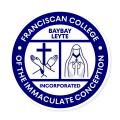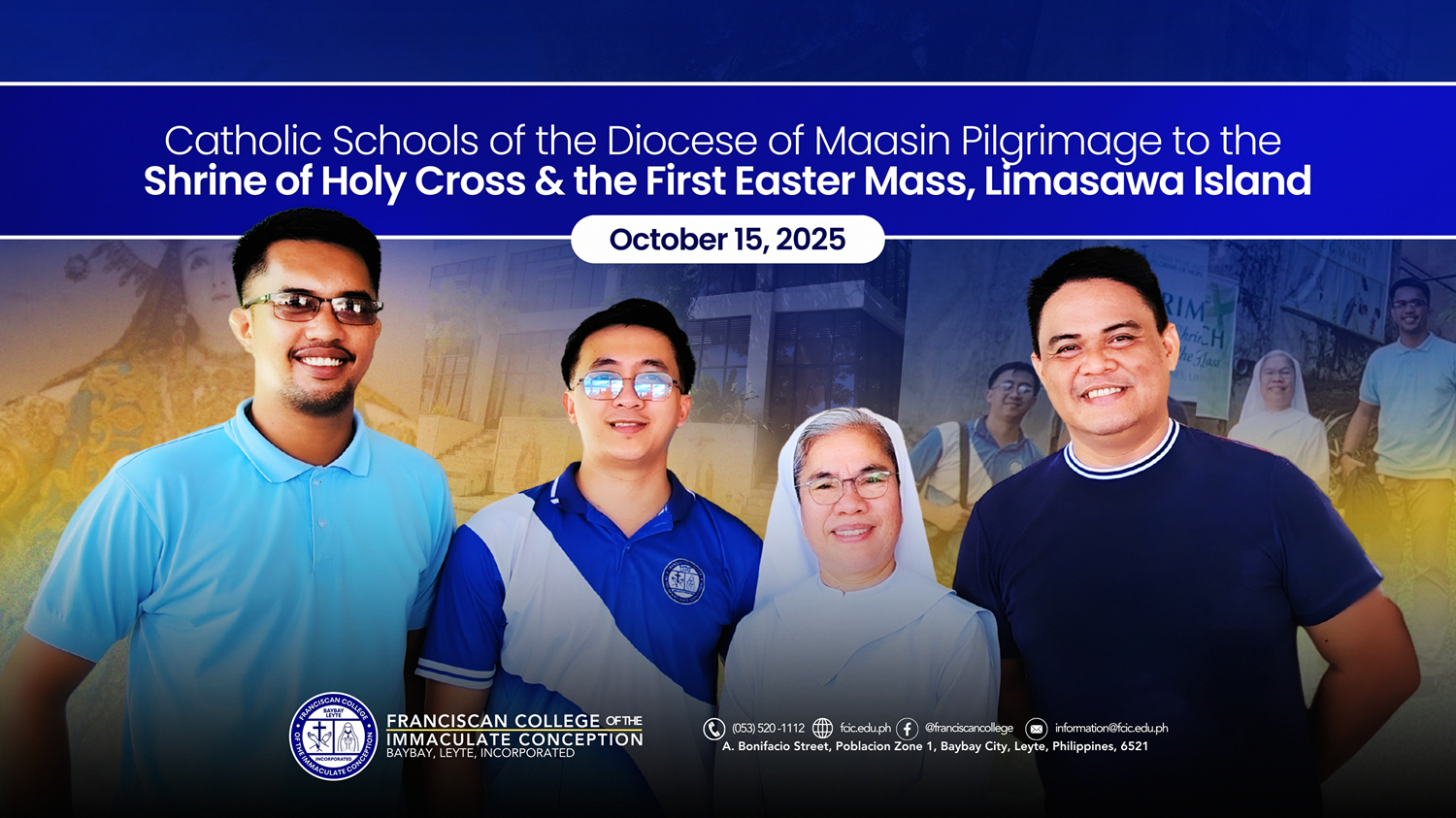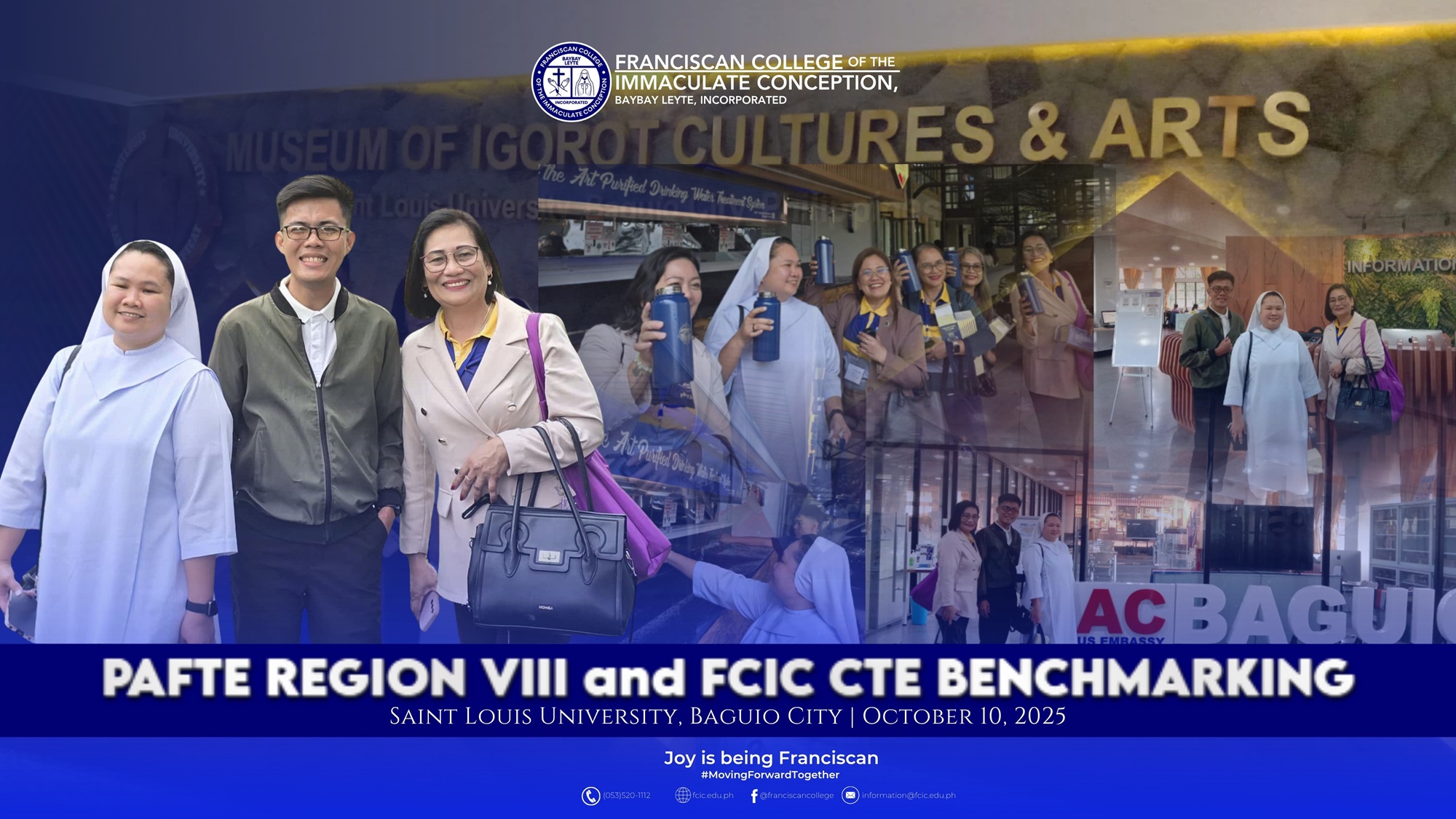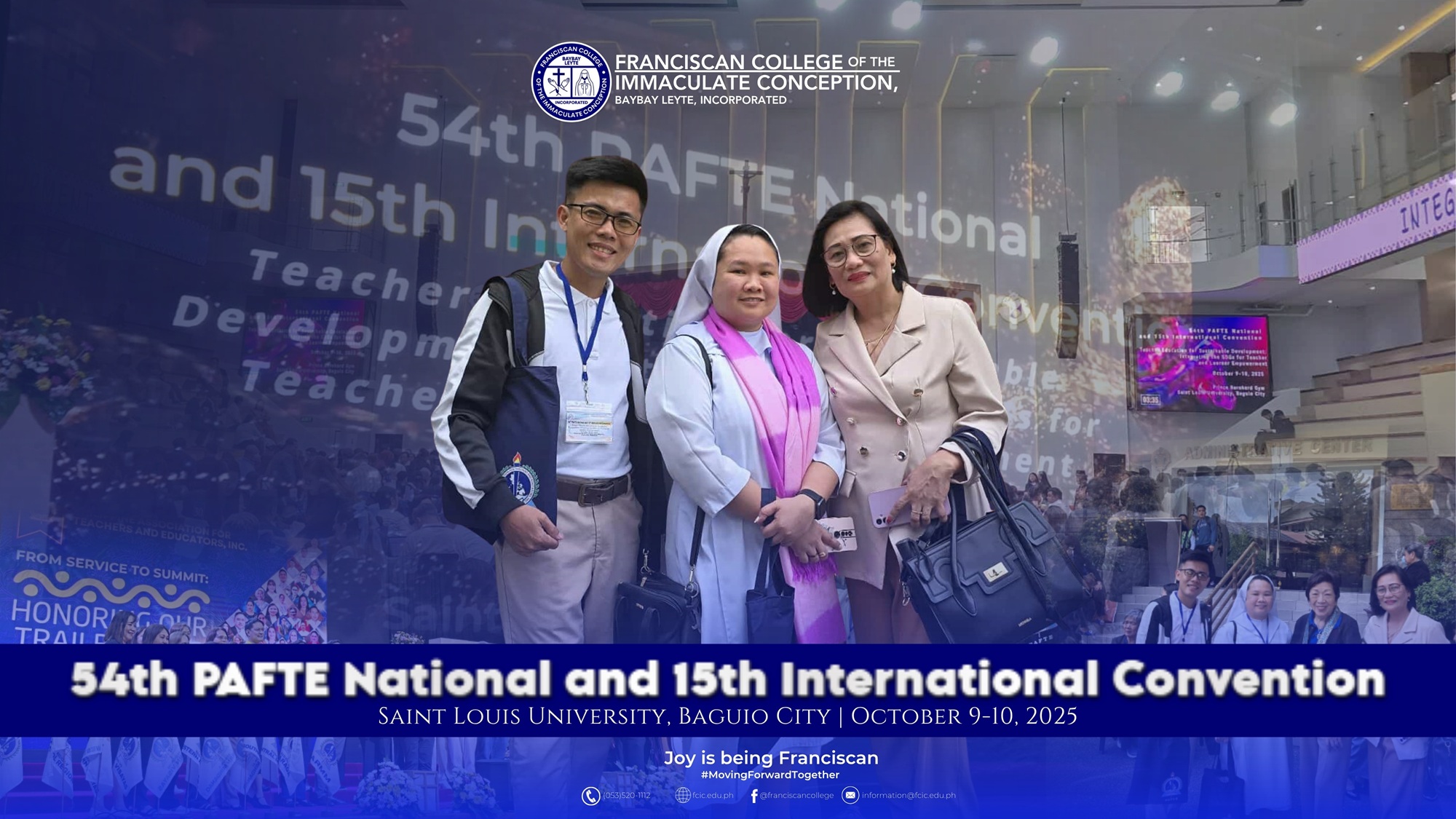On August 30, 2025, the Franciscan College of the Immaculate Conception (FCIC) joined other Catholic schools from Samar and Leyte at the CEAP Regional Assembly held at Tropics Hotel at McArthur Park, Palo, Leyte. The theme of the event was “Living in Synodality in Catholic Schools as Pilgrims of Hope in a Changing World.” This gathering helped everyone think deeply about how Catholic schools can collaborate and remain hopeful, even in challenging times.
The day started with a Mass led by the Bishop of Borongan, Most Rev. Crispin B. Vasquez, DD. In the homily, said something powerful, “The end of our pilgrimage is the end of our journey—the Church.” It reminded everyone that the Church is not just a place, but a community where people walk together in faith. He encouraged everyone to find a home in each other, to support one another, and to stay united. the message was clear, we are not alone in our journey.
Following the Mass, the CEAP Regional Trustee, Rev. Fr. Rey Navidad, gave a warm welcome to the participants. He shared how difficult the journey can be, but also emphasized the importance of persevering with hope. He shared a Bible verse from Matthew 16:24: “If any of you wants to be my disciple, you must deny yourself, take up your cross, and follow me.” This means that being a follower of Jesus takes sacrifice, but we don’t have to do it alone. Catholic schools help students walk together in faith and love.
Building on this message of unity and mission, CEAP National President Rev. Fr. Karel S. San Juan, SJ, delivered a video message highlighting three important roles of Catholic schools. First, Catholic schools must build and be part of strong communities where people work together in unity and faith. Second, they must help improve the quality of education in the Philippines, especially during times when many students face challenges in learning. Lastly, they have the responsibility to teach values such as honesty, compassion, and respect, which can help shape students into responsible citizens who contribute to making the country a better place.
To reinforce this, Fr. San Juan reminded teachers that they play a big role in shaping young minds and hearts. Schools should be places where students learn not just facts, but also kindness, honesty, and respect.
Echoing this call to mission, CEAP Vice President Rev. Fr. Joseph S. Tria also gave a speech. He said that Catholic schools should stand together in unity and care for others. He called Catholic schools “schools of kings, priests, and prophets,” meaning they have a special mission to lead, serve, and speak the truth. He encouraged everyone to help those who are last, least, or in lost.
Alongside spiritual and moral leadership, the assembly also addressed practical concerns. Br. Edmundo L. Fernandez, FSC, talked about how Catholic schools need to be smarter with money to stay strong and keep serving students. He said schools should make long-term financial plans, build honest and skilled finance teams, and follow clear rules to manage money well. Since most school income comes from tuition, he suggested keeping fees fair and finding other ways to earn, like running a canteen or bookstore, and using government support like PEAC and CHED grants. He also explained three types of budgets: deficit (spending more than earning), balanced (spending equals earning), and surplus (earning more than spending), and said schools should aim for a surplus to grow and stay stable.
Continuing the theme of holistic formation, the keynote address of Most Reverend Mylo Hubert C. Vergara, “Living Out Synodality in Catholic Schools,” highlighted the vital role of parents, schools, and the Church in nurturing faith and values among the young. He reminds us, through the Gospel of Luke, that Jesus welcomed children, showing their place at the heart of God’s Kingdom. In today’s world, however, young people face confusion, fear, and challenges such as bullying, academic struggles, and the distractions of technology, which weaken listening, reflection, and dialogue. These realities call Catholic schools to go beyond academics and to form the whole person — intellectually, morally, and spiritually — in partnership with families.
To deepen this understanding, Bishop Vergara emphasizes that synodality is a way of life that Catholic schools must embody. This involves listening, discernment, and accompaniment, creating safe spaces where students feel heard and supported. Synodality also demands inclusive participation, where grassroots communities, marginalized groups, and diverse voices are welcomed and valued. Catholic education should offer formation that touches both mind and heart, preparing students and teachers alike to live as missionary disciples through relevant catechesis that integrates faith, ecology, Eucharist, and social engagement. Leadership in a synodal school must be accountable and collaborative, marked by transparency, dialogue, and co-responsibility. Finally, schools are called to partnership and outreach, safeguarding children and building bridges within society, both offline and in the digital world.
Summing up his message, Bishop Vergara reminds Catholic schools that they are not only institutions of learning but also communities of faith that embody the very identity of a synodal Church: healing, inclusive, missionary, and accountable. By practicing synodality daily, schools can respond to the crises of lost dreams, broken families, and struggling students with compassion, courage, and hope. In this way, Catholic schools truly live out their mission of forming students who are not only knowledgeable but also deeply rooted in faith, values, and love of God and neighbor.
In line with this mission, the 2025 Senior High School curriculum reforms aim to better prepare students for work and lifelong learning. Catholic schools will simplify subjects, reduce tracks to Academic and Technical Professional, and allow students to mix electives freely. Core subjects are cut from 15 to 5, focusing on key areas like math, science, and communication. A new subject on work ethics and readiness will teach skills like teamwork and time management. Work immersion hours are doubled to give students more real-world experience. Schools are also encouraged to find other income sources and use government grants to support students. These changes help students grow in knowledge, skills, and values for a brighter future.
To further address the broader challenges in education, Congressman Jude A. Acidre shared insights on the need to strengthen Philippine education. He emphasized that the foundation of every learner must be fixed, beginning with the family, supported by the school, and reinforced by the wider community. He also highlighted concerns within the education workforce, noting that many teachers are forced to teach outside their field of specialization, pointing to the need for stronger faculty development, better administration, and more holistic support for both educators and learners. Another key insight was the fragmented system of governance, where educational and societal institutions often pursue different goals, resulting in a lack of unified vision for national development. To address this, Congressman Acidre stressed the importance of structured school instruction, along with stronger opportunities for higher education, technical-vocational training, and skills development that will prepare students for real-world challenges.
The CEAP Regional Assembly was more than just a conference—it was a journey of faith. It brought together schools that are committed to walking side by side, helping each other, and building a better future. In today’s fast-changing world, Catholic schools continue to be places of light and love, where students and teachers grow together.
As FCIC and other schools return to their campuses, they carry with them the spirit of synodality. They are ready to teach, serve, and walk with hope—just like pilgrims on a sacred journey.
By: Rowen Jay Loquillano
Contributor: Aldren Derecho | Francis Niel Murry | John Raphael P. Montejo







